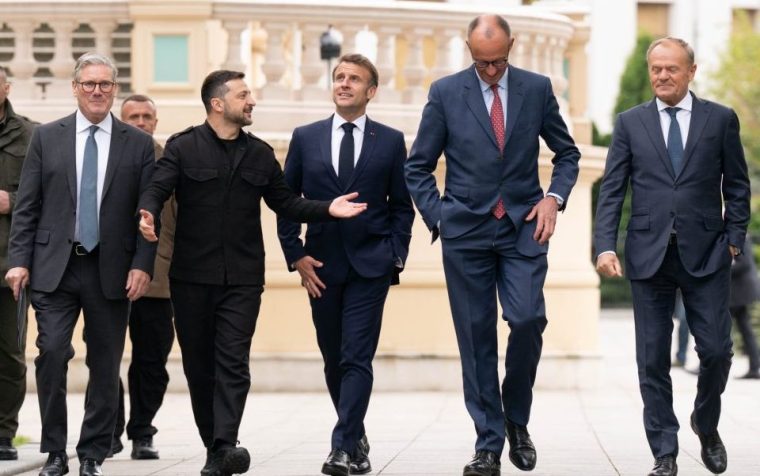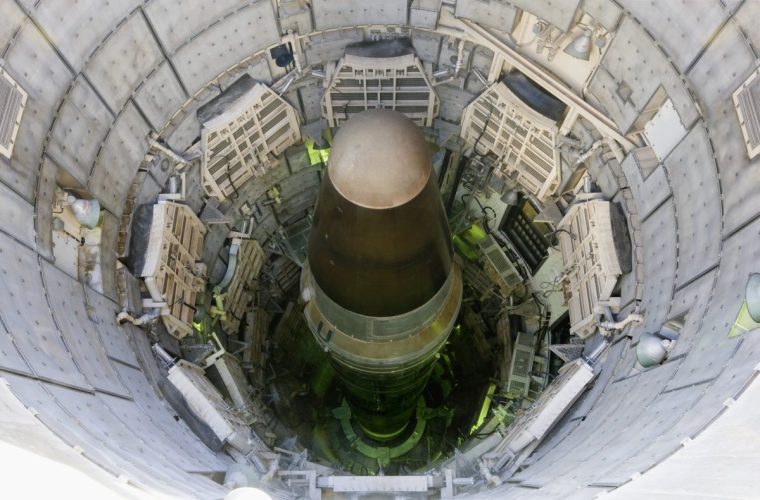France, Belgium, Germany, and Finland have backed proposals for stronger nuclear co-operation across Europe
Government officials across Europe have ramped up calls for their countries’ nuclear deterrents to be strengthened.
France, Belgium, Germany, and Finland are among the nations backing proposals for stronger nuclear co-operation across the continent.
Experts told The i Paper that the demands stem from concerns sparked by Russia’s war against Ukraine, as well as doubts over America’s commitment to guaranteeing European security under Donald Trump.
In recent weeks, repeated incursions by Russian drones and aircraft into Nato airspace have raised tensions further, and made the prospect of military engagement with Moscow more tangible for many European countries.
Which countries have called for stronger deterrence?
France, Britain and the US are the only Nato countries that can currently produce nuclear weapons. But under Nato’s nuclear-sharing arrangements, US nuclear weapons are also deployed in Turkey, Italy, Belgium, Germany and the Netherlands as part of the alliance’s security guarantees.
In March, French President Emmanuel Macron said he had “decided to open the strategic debate on the protection of our allies on the European continent” through nuclear deterrence. The remarks came just a month after Trump said he would “encourage” Russia to attack any Nato member that fails to pay its bills.
Macron’s announcement was welcomed by Poland’s Prime Minister, Donald Tusk, and his Danish counterpart, Mette Frederiksen.
Asked by reporters whether Denmark would be open to holding nuclear weapons on its territory, Frederiksen said: “It’s not something we are working on, but you won’t get me to stand here and say no to others’ ideas. Everything has to be on the table now.”
Days later, Polish President Andrzej Duda went further, calling on Washington to deploy nuclear weapons to Poland in an interview with the Financial Times. “I think it’s not only that the time has come, but that it would be safer if those weapons were already here,” he said.

Belgian Prime Minister Bart De Wever also backed the idea of a pan-European “nuclear umbrella”, while the chair of the Finnish parliament’s defence committee, Jukka Kopra, said he welcomed the “interesting” possibility of an expanded role for French nuclear weapons in Europe.
Lithuania’s defence minister, Dovile Sakaliene, suggested her country may need to alter its constitution to facilitate the deployment of nuclear weapons on its soil.
Meanwhile, Friedrich Merz, Germany’s chancellor, said he would reach out to France and Britain to discuss the sharing of nuclear weapons, but clarified that this would not be a substitute for America’s security guarantee in Europe.
“The sharing of nuclear weapons is an issue we need to talk about,” Merz told broadcaster Deutschlandfunk. “We have to be stronger together in nuclear deterrence.”
Why now?
Despite the threat to Europe posed by Russia, the prospect of America withdrawing military support is the primary driver behind increased calls for nuclear deterrence, said Jonathan Monten, associate professor in political science at University College London.
He told The i Paper: “Countries like Germany, Poland, and other European countries all have capabilities to produce nuclear weapons. What’s held them back is the credibility – the bargain – that they forego nuclear weapons, but in exchange the US guarantees their security, including through the use of American nuclear weapons if necessary.”
Monten said “that basic bargain is coming under question in a way that it hasn’t over the last 70 to 80 years”.

Sir Adam Thomson, the UK’s permanent representative to Nato between 2014 and 2016, and director of the European Leadership Network think-tank, told The i Paper that “the foundation and driver of the latest stirrings is that Europeans no longer believe that America’s security guarantee can be relied on”.
Thomson added that “Europeans now have to assume that it is not just Trump but the USA that is unreliable.
“It doesn’t mean that extra European states are suddenly going to get their own nuclear weapons,” he added. “There is still, thank God, a strong taboo against nuclear proliferation. But it does mean an increased focus on what more the British and French nuclear deterrents can do for their fellow Europeans.”
A last resort
Monten said that additional European countries developing nuclear weapons programmes would be a last resort if American security guarantees remained in doubt, and a pan-European deterrent was not successfully set up.
“Should that fail, then I think it is definitely possible that other governments will look seriously at the question of whether to create their own national, unilateral nuclear programme,” he said.
But Monten said that would mark a “major shift in the foreign policy” of these governments – and a shift away from public opinion, which has consistently showed reluctance over boosting Europe’s nuclear arsenal.
It would also mark a departure from the Nuclear Non-Proliferation Treaty (NPT), designed to limit the spread of nuclear weapons.
Lukasz Kulesa, director of proliferation and nuclear policy at the Royal United Services Institute (Rusi), told The i Paper that “moving towards sovereign nuclear capability would become a more attractive option if there were a complete and irreversible breakdown of the security relationship with the US, and also a major crisis of confidence in the relationship with the UK and France”.
Would it have any effect on Putin?
Matthew Rendall, a lecturer in politics and international relations at the University of Nottingham, cast doubt on the impact of any further European nuclear deterrent on Vladimir Putin.
“If Sweden acquired nuclear weapons, it would make little difference to Putin’s calculations, since he’d have to fight his way through Finland to get there,” he said.
“Even on its own, Finland could be a tough nut to crack. The Soviet Union got its nose bloodied there in the Second World War, and it’s unlikely that Moscow is in a hurry to repeat the experience,” he added.
Even so, Rendall sounds a note of caution over any increased nuclear proliferation in Europe: “It would be harder for Nato to make the case against states like Iran getting nuclear weapons if its own members are doing the same. It strikes me as a bad bargain.”
